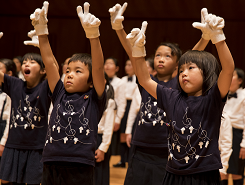This site uses Cookie to improve site usability. Please read Our Privacy Policy regarding the use of Cookie on our site.

White Hand Chorus
- Schedule
- 2025.4.1 Tue - 2026.3.31 Tue
- Venue
White Hand Chorus
El Sistema is a music education program with the aim of social change in Venezuela, South America.
The White Hand Chorus is an inclusive art activity born out of El Sistema, and in which all children regardless of disability can join.
What is the White Hand Chorus?
Started by José Antonio Abreu (1939 – 2018) in Venezuela, El Sistema is a music education program that has the goal of social change. It is based on a program in which all children can receive free music education in a group setting, regardless of the financial situation of the families of these children. It has the goal of helping children develop a sense of hope and pride by cultivating an attitude of proactively working toward goals while learning how to be cooperative and follow rules. This program has not only produced many world-class musicians, such as the young conductor Gustavo Dudamel, it has also been commended by external organizations such as UNESCO and the Inter-American Development Bank, etc., for protecting children from crime and violence and for having a positive impact on them, including from the aspect of learning. As of January 2016, the program has spread to more than 60 countries and regions. The Tokyo Metropolitan Theatre sympathizes with the philosophy of El Sistema and it has regularly held festivals to introduce its activities since 2008.
The White Hand Chorus was established in 1995, based on El Sistema, as an activity that all children can participate in, regardless of whether they have a disability or not. This chorus emphasizes the participation of children with hearing impairments, autism, and vocal difficulties. Children without vocal difficulties can do “vocal singing,” while children who have vocal difficulties can do “hand singing,” a performing art using white gloves. In a broad sense, the name of the White Hand Chorus came about because these children are vividly expressing the world of singing with white gloves.
The Tokyo Metropolitan Theatre held a symposium on El Sistema at the El Sistema Festival in 2013. In addition, a workshop for general participants was held in 2015, and we started the Tokyo White Hand Chorus in 2017 in partnership with El Sistema Japan with the goal of the joint development of music. In FY 2018, we welcomed visually impaired children to join the chorus, and we started pursuing the joy of creating beautiful music together that transcends the concept of disability. We are currently holding the Tokyo Children’s Ensemble and Creative Workshop with El Sistema Japan (incorporated) and the White Hand Chorus NIPPON in Tokyo workshop with El Sistema Connect (incorporated).
White Hand Chorus NIPPON in Tokyo
In a style similar to the White Hand Chorus which first started in Venezuela, this chorus consists of a sign group that sings by expressing lyrics by hand (in sign language) together with a group that sings. They aim to create art for a new era while respecting dialogue regardless of whether people have disabilities or not. Their main appearances include the New National Theatre Opera’s “Super Angels “, Bach Collegium Japan’s Beethoven Symphony No. 9 , NHK’s TV program “Minna no Uta’s ‘Tsubame’ “, etc.
Tokyo Children’s Ensemble and Creative Workshop
We create an environment in which all children, particularly children with visual impairments, can participate in chorus activities, and we create and express music from the perspective of the deaf. Any child who identifies with the creation of an inclusive society can participate.
-
In a style similar to the White Hand Chorus which first started in Venezuela, this chorus consists of a sign group that sings by expressing lyrics by hand (in sign language) together with a group that sings. They aim to create art for a new era while respecting dialogue regardless of whether people have disabilities or not. Their main appearances include the New National Theatre Opera’s “Super Angels “, Bach Collegium Japan’s Beethoven Symphony No. 9 , NHK’s TV program “Minna no Uta’s ‘Tsubame’ “, etc.
-
We create an environment in which all children, particularly children with visual impairments, can participate in chorus activities, and we create and express music from the perspective of the deaf. Any child who identifies with the creation of an inclusive society can participate.
